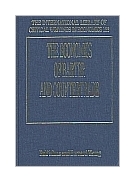|
||
• wydawnictwa polskie
• Zamów informacje o nowościach z wybranego tematu • kontakt
• Cookies na stronie |
THE ECONOMICS OF BARTER AND COUNTERTRADE.MIRUS R., YEUNG B.wydawnictwo: EE , rok wydania 2001, wydanie Icena netto: The Economics of Barter and Countertrade 'Countertrade is a more common phenomenon than many people realise, especially in East-West and North-South trade. Yet, superficially, countertrade is inefficient in comparison to monetary trade. The paradox of how an apparently inefficient trading mechanism can become so dominant attracted increasing theoretical interest in the 1970s and 1980s. The editors of this volume were amongst the intellectual leaders in the field. The literature on countertrade is quite diffuse, and the editors have performed a major service by bringing together the important contribution in a single volume. This will be an important source of reference for many years to come.' - Mark Casson, University of Reading, UK 'Mirus and Yeung have been pioneers in showing that countertrade is economically efficient. Here, a surprisingly large literature supports their insight. The papers use aspects of transaction cost economics to examine the efficiency aspects of countertrade.' - Alan M. Rugman, Indiana University This authoritative collection presents the most important published articles on barter and countertrade from early skepticism to the recent sophisticated theoretical models and empirical evidence. The papers selected focus upon the policy and managerial implications of barter and countertrade and explain the reasoning behind these arrangements in an environment characterized by transaction difficulties. They demonstrate that appropriately designed transactional governance is crucial for the efficiency of successful trading relationships between different parties. The Economics of Barter and Countertrade is a timely collection due to the resurgence of barter and countertrade following the Russian and Asian financial crises. It is an essential reference source for those with an interest in trade and international economic relations. About the Author Rolf Mirus, Professor of International Business, University of Alberta, Canada Bernard Yeung, Abraham Krasnoff Professor in Global Business and Professor of Economics, New York University and Area Research Director, William Davidson Institute, University of Michigan Contents PART I COUNTERTRADE: FORMS AND CHALLENGE OF THE CONVENTIONAL WISDOM PART II COUNTERTRADE AS SOLUTION TO TRANSACTIONAL DIFFICULTIES: EARLY ANALYTICAL LITERATURE PART III THE LITERATURE IN THE NINETIES: DOUBLE MORAL HAZARD, HOSTAGE EXCHANGE, AND QUANTITY STIPULATION PART IV RISK SHARING PART V PRICE DISCRIMINATION PART VI POLICY IMPLICATIONS PART VII MANAGERIAL ASPECTS PART VIII DOMESTIC BARTER IN THE ABSENCE OF CREDIBLE HAT MONEY PART IX CONCLUSION 387 pages Księgarnia nie działa. Nie odpowiadamy na pytania i nie realizujemy zamówien. Do odwolania !. |


